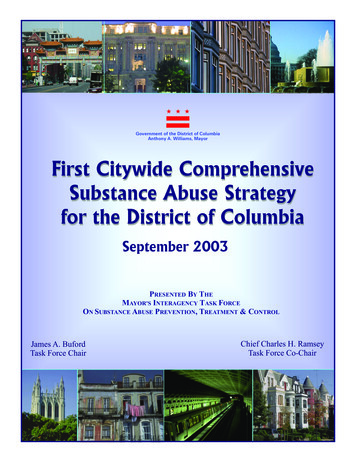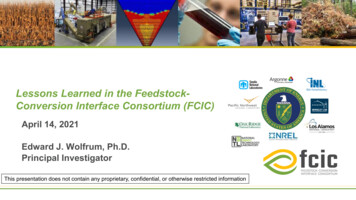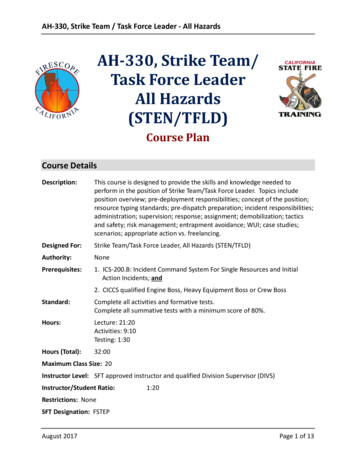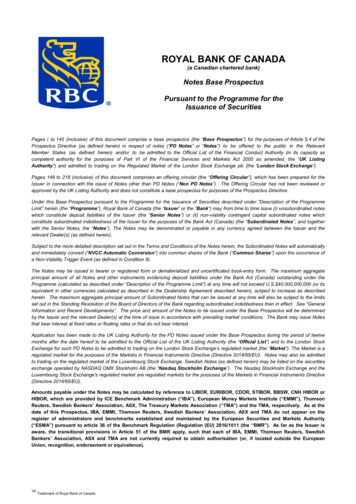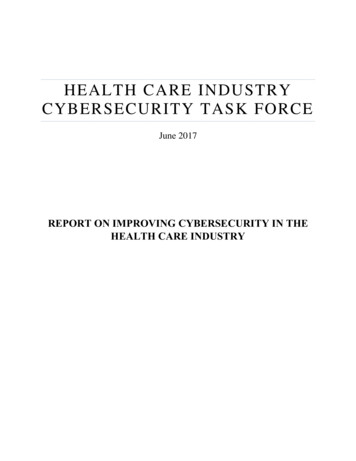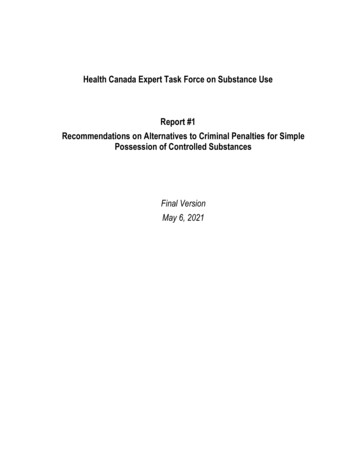
Transcription
Health Canada Expert Task Force on Substance UseReport #1Recommendations on Alternatives to Criminal Penalties for SimplePossession of Controlled SubstancesFinal VersionMay 6, 2021
Health Canada Expert Task Force on Substance Use, Report 1, May 2021Recommendations on Alternatives to Criminal Penalties for Simple Possession of Controlled SubstancesTable of ContentsMessage from the Co-Chairs . iExecutive Summary.iiIntroduction . 1Task Force Members . 1Task Force Guiding Principles . 3Approach / Methodology. 3Core Issues . 5Other Considerations . 8Recommendations and Advice . 11Appendix A – Task Force Member Bios . 15Appendix B – Glossary of Terms . 23Appendix C – Suggested Background Materials: Expert Task Force on Substance Use . 26
Health Canada Expert Task Force on Substance Use, Report 1, May 2021Recommendations on Alternatives to Criminal Penalties for Simple Possession of Controlled SubstancesMessage from the Co-ChairsMay 6, 2021Shannon Nix, Associate Assistant Deputy MinisterControlled Substances and Cannabis Branch, Health CanadaDear Associate Assistant Deputy Minister,We are pleased to submit this first report from the Health Canada Expert Task Force onSubstance Use on alternatives to criminal penalties for simple possession of controlledsubstances.We are honoured to have been given the task of Co-Chairing this Task Force and are consciousof the historical opportunity this represents to contribute to the discussion on how to improvethe way controlled substances are managed and regulated in Canada.It is a privilege to have the opportunity to work with the diverse group of experts who make upthe Task Force. Each member has brought a unique perspective to our collective effort, and allhave contributed to a rich dialogue that has resulted in the recommendations we present toyou today. Though the Task Force members have diverse views, they are united in the beliefthat criminal penalties for simple possession and consumption of controlled substances needsto end and that there is a spectrum of viable alternatives available to government.The Task Force received presentations and written submissions from a variety of sources. Weare thankful to all those who shared their knowledge and wisdom. They have helped the TaskForce to develop its thinking and build recommendations based on the best evidence. Finally,our thanks go to the Secretariat and to the report-writer who have so skillfully supported usthrough this work.Sincerely,Carol HopkinsDr. Kwame McKenzieMike SerrCo-Chairs, Health Canada Expert Task Force on Substance UsePage i
Health Canada Expert Task Force on Substance Use, Report 1, May 2021Recommendations on Alternatives to Criminal Penalties for Simple Possession of Controlled SubstancesExecutive SummaryThis report presents the conclusions and recommendations from the first part of the mandateof the Health Canada Expert Task Force on Substance Use. The Task Force met, heardpresentations, reviewed documents, and deliberated on the topic of alternatives to criminalpenalties for simple possession of controlled substances from March 10 to May 4th, 2021.The Task Force found that criminalization of simple possession causes harms to Canadians andneeds to end. The Task Force was mindful of five core issues when making recommendations:stigma; disproportionate harms to populations experiencing structural inequity; harms from theillegal drug market; the financial burden on the health and criminal justice systems; andunaddressed underlying conditions.The Task Force also considered Canada’s obligations under international treaties, lessonslearned in other jurisdictions, the important issue of safety, supports for community, recentdevelopments under the Controlled Drugs and Substances Act, and the broader Canadian legalframework.The Task Force makes the following recommendations related to decriminalization andregulation:1. The Task Force unanimously recommends that Health Canada end criminal penalties relatedto simple possession and most also recommend that Health Canada end all coercivemeasures related to simple possession and consumption.2. Most Task Force members recommend that the Government of Canada immediately begina process of legislative change to bring the Controlled Drugs and Substances Act (CDSA), theTobacco and Vaping Products Act (TVPA), the Cannabis Act, and any other relevant federallegislation under a single public health legal framework with regulatory structures that arespecific to different types of substances.3. The Task Force recommends that thresholds for simple possession be based onpresumption of innocence, and that they be set high enough to account for the purchasingand consumption habits of all people who use drugs.4. As part of decriminalization, the Task Force recommends that criminal records fromprevious offenses related to simple possession be fully expunged. This should be completedeletion, automatic, and cost-free.In addition, the Task Force makes the following related recommendations:5. The Task Force recommends that Canada make significant investments in providing a fullspectrum of supports for people who use drugs or substances or who are in recovery.6. The Task Force recommends the implementation of a more comprehensive and responsivesystem to rapidly and effectively gather, use, and disseminate evidence about substanceuse, its effects, and the impacts of government policies on the health and wellbeing ofCanadians.Page ii
Health Canada Expert Task Force on Substance Use, Report 1, May 2021Recommendations on Alternatives to Criminal Penalties for Simple Possession of Controlled Substances7. The Task Force strongly urges Health Canada to respect the sovereign rights of theIndigenous Peoples of Canada and support their governments in providing appropriateprevention and treatment approaches.8. The Task Force recommends that Health Canada convene a new committee that centrespeople with lived and living experience of substance use to provide advice on theimplementation of its recommendations.Page iii
Health Canada Expert Task Force on Substance Use, Report 1, May 2021Recommendations on Alternatives to Criminal Penalties for Simple Possession of Controlled SubstancesIntroductionCanada is facing an unprecedented and tragic drug toxicity crisis. Between January 2016 andSeptember 2020, 19,355 apparent opioid toxicity deaths were recorded. 96% of those deathswere accidental, and 60% of accidental opioid toxicity deaths in 2020 also involved a stimulant,evidence that the crisis is about more than one substance1. The crisis has escalated during theCOVID-19 pandemic, and while governments have implemented some measures, supportingexpanded treatment approaches, implementing pilot projects that provide pharmaceuticalalternatives to people who use the illegal drug market, and expanding overdose preventionservices, these measures have not been sufficient to stem the crisis. A wider health promotionapproach to substance use is needed to deal with the systemic issues, stigma, and racism thatare fuelling it.Recognizing the profound changes in the Canadian landscape in recent years, and the need toreflect those changes in its policies, Health Canada established the Expert Task Force onSubstance Use (“Task Force”) to provide Health Canada with independent, expert advice andrecommendations on: potential alternatives to criminal penalties for the simple possession of controlledsubstances, with the goals of reducing the impacts of criminal sanctions on people whouse drugs, while maintaining support for community and public safety; and the federal government’s drug policy, as articulated in a draft Canadian Drugs andSubstances Strategy (CDSS), with the objectives of further strengthening thegovernment’s approach to substance use.The Task Force convened for the first time on March 10, 2021 and was tasked with providingtwo reports to the Associate Assistant Deputy Minister, Controlled Substances and CannabisBranch, Health Canada. This is the first of those two reports; it describes the work of the TaskForce to date and outlines its recommendations and expert advice on alternatives to criminalpenalties for simple possession of controlled substances.The Task Force will later submit a final report with recommendations that inform thefinalization of the draft CDSS.Task Force MembersThe following people participated as members of the Task Force. Bios of Task Force membersare provided in Appendix A.Carol Hopkins (Co-Chair), CEO, Thunderbird Partnership Foundation (a division of the NationalNative Addictions Partnership Foundation)1Government of Canada, Opioid- and Stimulant-related Harms in Canada, March 2021Page 1
Health Canada Expert Task Force on Substance Use, Report 1, May 2021Recommendations on Alternatives to Criminal Penalties for Simple Possession of Controlled SubstancesDr. Kwame McKenzie (Co-Chair), CEO of Wellesley Institute, Director of Health Equity at theCentre for Addiction and Mental Health, Full Professor in Psychiatry at theUniversity of Toronto and consultant with the World Health OrganizationMike Serr (Co-Chair), Chief Constable, Abbotsford Police Department; Chairperson of the DrugAdvisory Committee, Canadian Association of Chiefs of Police (CACP), and Chairof the CACP’s Special Purposes Committee on the Decriminalization of IllicitDrugsNatasha Touesnard (Co-Chair), Executive Director, Canadian Association of People who UseDrugs (withdrew on April 21, 2021)Serge Brochu, PhD, Professor, École de criminologie at the Université de MontréalDeirdre Freiheit, President and CEO, Shepherds of Good Hope (SGH) and Shepherds of GoodHope FoundationGord Garner, Executive Director, Community Addictions Peer Support AssociationCharles Gauthier, President and CEO, Downtown Vancouver Business Improvement AssociationCheyenne Johnson, Co-Interim Executive Director, British Columbia Centre on Substance Use(BCCSU) and founding Director of BCCSU’s Addiction Nursing Fellowship ProgramHarold R. Johnson, Elder, Advisor and Ambassador, Northern Alcohol Strategy Saskatchewan,Former Crown ProsecutorDamon Johnston, Chair, Addictions Foundation of Manitoba, and President, Aboriginal Councilof WinnipegEl Jones, Spoken Word Poet, Educator, Journalist, and a Community activist living in AfricanNova ScotiaRobert Kucheran, Chairman of the Executive Board, Canada’s Building Trades UnionsAnne Elizabeth Lapointe, Executive Director, Maison Jean Lapointe and Addiction PreventionCentreDr. Shaohua Lu, Addiction Forensic Psychiatrist, Member of the College of Surgeons andPhysicians of BC Prescription Review PanelDonald MacPherson, Director, Canadian Drug Policy CoalitionAkwasi Owusu-Bempah, PhD, Assistant professor, Department of Sociology, University ofTorontoDan Werb, PhD, Executive Director, Centre on Drug Policy Evaluation, MAP Centre for UrbanHealth Solutions, Li Ka Shing Knowledge Institute of St. Michael’s Hospital,Assistant Professor, University of Toronto Institute of Health Policy,Management and Evaluation, and Assistant Professor, University ofCalifornia San Diego Division of Infectious Diseases and Global Public HealthPage 2
Health Canada Expert Task Force on Substance Use, Report 1, May 2021Recommendations on Alternatives to Criminal Penalties for Simple Possession of Controlled SubstancesTask Force Guiding PrinciplesThe Co-Chairs and Task Force members have engaged in discussions on guiding principles tosupport their collective work. The principles are a living document and continue to evolve asthe Task Force deepens its understanding of the diverse perspectives of its members and worksto reconcile them. The following high-level principles have informed Task Force discussions onalternatives to criminal penalties: Respect the Charter and human rights of all people who use drugs. Centre the voices of people with lived and living experience of substance use, in partnershipwith multiple other stakeholders distributed across a continuum of health and socialresponses. Recognize that substance use is a complex phenomenon, that people are motivated to usesubstances for several reasons, and that substance use occurs in a variety of differentcontexts that greatly influence health and social well-being. Acknowledge that while substance use can lead to harms to individuals, families, andcommunities, many of these harms derive from problematic public policies and structuralinequity, and most people who use drugs do so without significant harm to themselves orothers. Recognize that drug criminalization has amplified structural inequities in Canada, and thatthese have contributed to First Nations, Inuit, Métis, and Black people beingdisproportionately and negatively impacted by much higher rates of criminal prosecutionand incarceration. Consider the benefit of viewing substance use through a health promotion lens, recognizingthe impact of the social determinants of health on outcomes, and the need for multiplepathways and approaches to reduce harms. Be mindful of the roles that various governments – federal, provincial, territorial, FirstNations, Inuit, and Métis – play and should play in addressing substance use in Canada, andof Canada’s obligations under international treaties. Be mindful of the dynamic and often violent and predatory nature of the illegal drugmarket, and of continuing efforts to reduce the involvement of organized crime.Approach / MethodologyOverviewThe work of the Task Force on alternatives to criminal penalties took place over a series of sixmeetings, on March 10, March 24, April 7, April 14, April 21 and April 28, 2021. Meetings lastedbetween two (2) and five (5) hours and were held using an online web conferencing tool. ThePage 3
Health Canada Expert Task Force on Substance Use, Report 1, May 2021Recommendations on Alternatives to Criminal Penalties for Simple Possession of Controlled SubstancesTask Force Secretariat prepared records of proceedings, which are available under separatecover, for each of the meetings.Task Force members reviewed documents and briefs before meetings. They also collaboratedand exchanged asynchronously between meetings using email and the Government of Canada’sGCcollab platform.Documents ReviewedTask Force members were invited to review the background documents listed in Appendix B. Inaddition, the Task Force received and considered the following documents to inform its work: Advancing Drug Policy Reform: A New Approach To Decriminalization, Global Commissionon Drug Policy, 2016 A New Approach to Managing Illegal Psychoactive Substances in Canada, Discussion Paperof the Canadian Public Health Association, 2014 The Effectiveness of Compulsory Drug Treatment: A Systematic Review, International Journalof Drug Policy. Author manuscript, 2017 Relapse to opioid use in opioid-dependent individuals released from compulsory drugdetention centres compared with those from voluntary methadone treatment centres inMalaysia: a two-arm, prospective observational study, Lancet Global Health, 2017 Regulation - The Responsible Control of Drugs, Global Commission on Drug Policy, 2018 How to Regulate Stimulants – A Practical Guide, Transform Drug Policy Foundation, 2020 Stopping the Harm: Decriminalization of People Who Use Drugs in BC, Provincial HealthOfficer’s Special Report, BC Office of the Provincial Health Officer, 2019 The World Drug (Perception) Problem: Countering Prejudices about People Who Use Drugs,Global Commission on Drug Policy, 2017 Drug Decriminalisation: Progress or Political Red Herring? Assessing the Impact of CurrentModels of Decriminalisation on People Who Use Drugs, International Network of Peoplewho Use Drugs, 2021 A Quiet Revolution: Drug Decriminalisation Across the Globe, Release – Drugs, The Law &Human Rights, 2016Presentations and SubmissionsThe following organizations presented to the Task Force on alternatives to criminal penalties forsimple possession of controlled substances:March 10, 2021 Health CanadaPage 4
Health Canada Expert Task Force on Substance Use, Report 1, May 2021Recommendations on Alternatives to Criminal Penalties for Simple Possession of Controlled SubstancesMarch 24, 2021 Moms Stop the Harm HIV Legal Network – Presentation and written brief Aboriginal Legal Services – Presentation and written submissionApril 7, 2021 Transform Drug Policy Foundation (UK) Pivot Legal Society Canadian Association of People Who Use DrugsApril 21, 2021 Canadian Students for Sensible Drug Policy Canadian Association of Chiefs of PoliceCore IssuesThe presentations and documentation underlined that criminalization of simple possessioncauses harms to Canadians; simply put:“My son Danny died from Fentanyl poisoning – a victim of bad drug policy.”2“Although punitive policies claim to protect young people, ultimately they create moreharm than good, both for young people and their broader communities.” 3This section of the Task Force report highlights specific core issues that our recommendationsseek to address regarding the negative impacts of criminalization. These core issues are stigma,disproportionate harms to populations experiencing structural inequity, harms from the illegaldrug market, the financial burden on the health and criminal justice systems, and unaddressedunderlying conditions.StigmaCurrent public policies on substance use, and criminalization chief among them, are part of avicious cycle that is fed by and continues to feed inaccurate, stigmatizing perceptions of peoplewho use drugs. Canada’s current policies are based on an outdated and deeply problematicposition, which the Task Force members reject, that devalues and dehumanizes people who usedrugs by labelling them as immoral, “addicts”, or weak.23Moms Stop the Harm, Presentation to the Task Force, March 2021Canadian Students for Sensible Drug Policy, Presentation to the Task Force, April 2021Page 5
Health Canada Expert Task Force on Substance Use, Report 1, May 2021Recommendations on Alternatives to Criminal Penalties for Simple Possession of Controlled SubstancesFurthermore, by criminalizing simple possession, Canada’s Controlled Drugs and Substances Act(CDSA) increases the stigma by labelling people who use drugs as criminals, which multiplies theharms they experience and increases the risk of negative outcomes, even for people who usesubstances occasionally or for the first time4.Yet evidence suggests that most people who use drugs do so for an actual or perceived benefitand may not develop a substance use disorder or experience other drug-related harms:“Drug use is relatively common and, in 2016, an estimated quarter of a billion peopleused currently illegal drugs, while about 11.6% of these are considered to sufferproblematic drug use or addiction. The most common pattern of use of psychoactivesubstances is episodic and non-problematic.”5In Canada, in 2017, 47.9% of Canadians had used illegal drugs in their lifetime6. 15% ofCanadians aged 15 or older reported using an illicit drug (cannabis, cocaine or crack, ecstasy,speed or methamphetamines, hallucinogens, or heroin) in the previous year, but only 4%reported experiencing at least one harm from their illicit drug use in the same period7.Disproportionate harms to populations experiencing structural inequityThe legislation criminalizing drug possession is part of historical and ongoing structural racismand continues to have disproportionate effects on Indigenous and Black populations, which aremore often targeted for prosecution for simple drug offenses.“It must always be kept in mind that substance use in the Indigenous community arisesas a consequence of colonial action and harm.”8“The never-ending drug war is a war on us that has caused massive and irreparableharm to Black communities, who are over-criminalized, disproportionally impacted, andover-surveilled.”9Incarceration has greater negative impacts on women and their families than on men.“Federally-sentenced women are 2x more likely to serve a sentence for drug-relatedoffences than male counterparts. Indigenous and Black women are more likely thanwhite women to be in prison for that reason.”104Public Health Agency of Canada, Highlights from phase one of the national study on opioid and other drugrelated overdose deaths: insights from coroners and medical examiners, 20195Global Commission on Drug Policy, The World Drug (Perception) Problem: Countering Prejudices about PeopleWho Use Drugs, 20176Statistics Canada, Canadian Tobacco, Alcohol and Drugs (CTADS) Survey, 20177Statistics Canada, Canadian Tobacco, Alcohol and Drugs (CTADS): summary of results for 2017, 20178Aboriginal Legal Services, Submission from Aboriginal Legal Services to the Task Force, March 20219Canadian Association of People Who Use Drugs, Presentation to the Task Force, April 202110HIV Legal Network, Drug Decriminalization and International Law: Brief submitted to the Health Canada ExpertTask Force on Substance Use, March 2021Page 6
Health Canada Expert Task Force on Substance Use, Report 1, May 2021Recommendations on Alternatives to Criminal Penalties for Simple Possession of Controlled SubstancesYouth who are caught up in the criminal justice system because of simple possession orsubstance use have inadequate pathways to access support and face major struggles toovercome the negative economic, social, and health impacts of criminal records11,12.And people without status – international students, refugee claimants, temporary foreignworkers – are unable to seek help or supports because they fear being reported and removed.Harms from the illegal drug marketDrug criminalization leads to drug toxicity deaths in Canada. Specifically, drug criminalizationhas resulted in an unregulated market that is rife with contaminants and toxic, high-potencyopioids and other substances, which has led to tens of thousands of deaths since 2016 alone, asnoted in the introduction to this report. The link has been clearly established, for example bythe Office of the Provincial Health Officer of BC:“Due to the toxicity of BC’s illegal drug supply, there is considerable risk of overdose andoverdose death related to illegal drug use in any capacity, including use that is otherwisebeneficial or non-problematic.”13The physical and psychological violence inherent to the illegal drug trade also directly andindirectly harms people who use drugs. And not only are specific communitiesdisproportionately affected by criminalization, they are also disproportionately affected by theviolence associated with the illegal drug market.Financial burden on the health and criminal justice systemsCriminalization leads to higher drug-related health costs because it keeps people who use drugsaway from prevention and early treatment health services due to fear of being arrested,labelled, or outed.“Criminalization drives people underground and means that people are less likely toseek assistance, or have difficulties if they try to obtain assistance.”14Because criminalization pushes people who use drugs to rely on an illegal, often contaminateddrug supply, it is also responsible for high hospitalization costs.“23,240 opioid-related and 10,518 stimulant-related poisoning hospitalizations occurredfrom January 2016 to September 2020 in Canada (excluding Quebec)” 1511The John Howard Society of Canada, Criminal Records and Discrimination, 2016CMAJ, Overincarceration of Indigenous people: a health crisis, 201913BC Office of the Provincial Health Officer, Stopping the Harm: Decriminalization of People Who Use Drugs in BC,Provincial Health Officer’s Special Report, April 201914Aboriginal Legal Services, Submission from Aboriginal Legal Services to the Task Force, March 202115Government of Canada, Opioid- and Stimulant-related Harms in Canada, March 202112Page 7
Health Canada Expert Task Force on Substance Use, Report 1, May 2021Recommendations on Alternatives to Criminal Penalties for Simple Possession of Controlled SubstancesIn 2017, the estimate of healthcare costs in Canada related to the use of opioids and otherdepressants and cocaine and other stimulants was one billion dollars16.The cost to our country of policing and of legal proceedings related to drug possession is alsohigh:“More than 6.4 billion of policing, courts and correctional costs in 2017 could beattributed to the use of criminalized substances”17Unaddressed underlying conditionsSocial determinants of health, trauma, and other underlying factors often contribute tosubstance use disorders. Criminalization means that these underlying conditions often gounaddressed, both because people who use drugs are fearful of seeking treatment and beingreported by healthcare and other service professionals who may not be appropriately preparedto meet their needs, and because the billions spent on policing and legal proceedings are notavailable to address the social determinants of health.“Canada has made (dis)investment decisions that further marginalize PWUD: Fundingcuts to housing (decreased cost-based/non-profit through CMHC); Underinvestment inpensions, EI; Underinvestment in transfer payments for provincial programming(housing, healthcare); Continued failure to create universal pharmacare program”18Other ConsiderationsInternational TreatiesThe Task Force received and considered information about Canada’s obligations under UN drugcontrol conventions, including the Single Convention on Narcotic Drugs, the Convention onPsychotropic Substances, and the UN Convention Against Illicit Traffic in Narcotic Drugs andPsychotropic Substances.The Task Force accepts the argument, presented by the HIV Legal Network, that theseconventions are not an impediment to decriminalization or legalization of simple possession:“Under international law, Canada has both important latitude under the drug controlconventions, and important obligations under human rights treaties it has ratified. It canand should use that latitude in the realm of drug control to better respect, protect and16Canadian Institute for Substance Use Research and the Canadian Centre on Substance Use and Addictions,Canadian Substance Use Costs and Harms 2015–2017, 202017Canadian HIV/Aids Legal Network, Decriminalizing drug possession for personal use in Canada: Recentdevelopments, 202018Pivot Legal Society, Ending the War on Drugs: Legal Alternatives to Drug Prohibition, Presentation to the TaskForce, April 2021Page 8
Health Canada Expert Task Force on Substance Use, Report 1, May 2021Recommendations on Alternatives to Criminal Penalties for Simple Possession of Controlled Substancesfulfil the human rights it has pledged to uphold, and which are also embodied to variousdegrees in its own constitution.”19Members of the Task Force believe that our recommendations on this aspect are protectedunder the articles that make any penalties subject to countries’ constitutional principles andlimitations. It is clear to us that our recommendations are essential to respect Canadianconstitutional principles set out in the Canadian Charter of Rights and Freedoms, morespecifically Section 7 on Life, liberty and security of the person.Lessons Learned in Other JurisdictionsOver 30 countries have either never criminalized possession of substances or haveimplemented formal decriminalization policies20. The Task Force is aware of variousinternational models like those in Uruguay and Spain, where drug possession has never been aformal criminal offence, and Portugal, where penalties are administrative rather thancriminal21. We are also aware of the potential for unintended outcomes such as thoseexperienced in the Czech Republic in 2010 (confusion leading to increased arrests) and SouthAustralia in 2020 (administrative fines leading to ‘de facto’ criminalization, with more peoplereceiving civil sanctions and being incarcerated due to non-payment of fines)22.The Task Force has considered the lessons learned in these other jurisdictions in developing itsrecommendations, but was also committed to making recommendations specifically for Canadaand its unique context, notably the drug toxicity epidemic compounded by longstandingstructural racism.SafetyAlthough the focus of this report is on alternatives to criminal penalties, the Task Forcerecognizes that increased supports for people who use drugs are urgently needed and willcontinue to be required. While most people who use drugs do so for their perceived benefitsand without developing a substance use disorder or experiencing other drug-related harms, fora small minority of people drug use becomes problematic and may jeopardize their safety.The risks are different for different substances. A comprehensive system of health and socialsupports for different substances and social contexts is needed to
Force to date and outlines its recommendations and expert advice on alternatives to criminal penalties for simple possession of controlled substances. The Task Force will later submit a final report with recommendations that inform the finalization of the draft CDSS. Task Force Members The following people participated as members of the Task Force.

